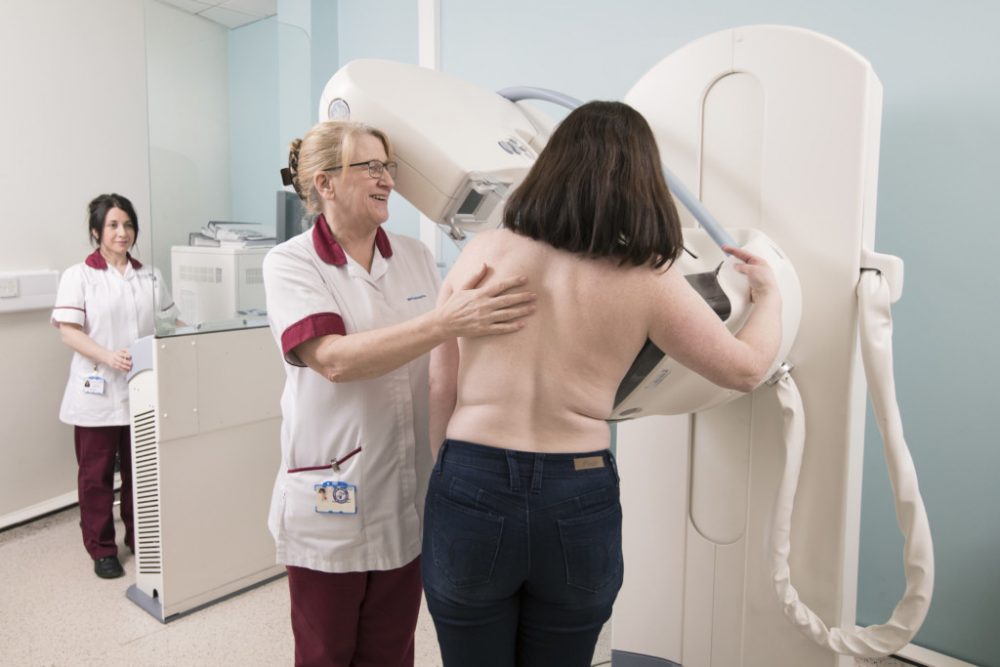No two women have the same risk of developing breast cancer. The BC-Predict (Breast Cancer Predict) research study aims to provide women with personalised information on their risk of developing breast cancer, through an easy-to-use online questionnaire.
The study is being led by Professor Gareth Evans (Manchester University NHS Foundation Trust) and Professor David French (The University of Manchester), together with a large team of experienced researchers.
Below you can find a range of information about the study, and how you can take part.


What is BC Predict?
Answers to the questionnaire alone can be used to calculate a woman’s 10-year risk of developing breast cancer. Results are more accurate when combined with breast density measurements taken during a routine mammogram.
The research team are recruiting 8000 women to compare this method against the standard breast screening programme. In some areas, some participants will be asked to provide a saliva sample, which will be analysed for small genetic changes that we know can affect breast cancer risk.
Some women may be asked to complete questionnaires to measure the impact of receiving breast cancer risk information for example, on anxiety, or to take part in an interview about their experience of BC-Predict.
BC-Predict is part of the Predicting-Risk-Of-Cancer-At-Screening (PROCAS-2) research programme which follows on from the highly successful PROCAS-1 study. Similarly to BC-Predict, PROCAS-1 estimated a woman’s personalised breast cancer risk from their breast density and a paper questionnaire.
In this study, researchers found that over 94% of the 58,000 women who participated wished to know their personal risk of breast cancer.

How is it different from standard breast screening?
Currently, NHS breast screening in England does not offer women personalised risk information.
BC-Predict does, and is based on information on a woman’s age, reproductive history, family cancer history, and lifestyle. A woman’s mammogram is also used to measure breast density – the amount of tissue in the breast that is not fat, which can increase a woman’s risk of breast cancer.

Who can take part in this research?
- Their very first breast screening appointment, or
- Their next planned screening closest to their 60th birthday, which may fall before or after the date itself.
Shortly after receiving their regular breast screening letter by post, they should receive a separate letter inviting them to BC-Predict, which will have detailed information about the study and how to take part.
Women will be able to access the BC-Predict online questionnaire up to six weeks after the date offered for their screening. After this date, the questionnaire will close and they will not be able to take part.

What does it involve?
Some women may also be asked to provide a saliva sample for genetic testing when they go for their mammogram.

How do I access the online questionnaire?

What happens after completing the questionnaire?
These results will automatically generate a letter informing you of your personalised breast cancer risk, which is sent to you and your GP, and information on how to reduce your risk.
Regardless of your risk, you can request an appointment with a specialist doctor to discuss your results. This can be face-to-face or over the telephone, and will cover potential care and treatments that could help reduce your risk. Women above average or at high risk can discuss the offer of more frequent screening and / or medication to reduce their risk.
| What changes to my breast screening can I discuss? | ||||
| Below average risk | Average risk | Above average | High risk | |
| Age 46+ | No changes (at the moment) | No changes | Medication to reduce risk | Medication to reduce risk |
| Age 46-49 | Extra mammography screening (then return 3-yearly at age 50) | |||
| Age 46-59 | Extra mammography screening (then return 3-yearly at age 50) | |||

Do I have to take part and can I opt out?
Participation in BC-Predict is entirely optional, and you can choose to withdraw from the study at any time by contacting the research team.

Who can I contact for more information?
MFT will own all Intellectual Property created by participating sites and contributors as a result of this programme of work.
 In this section
In this section